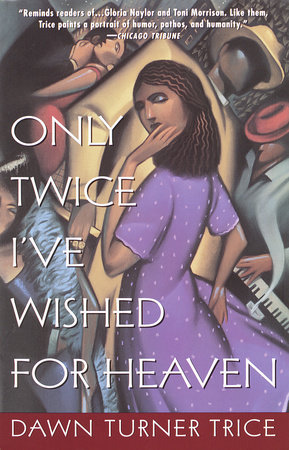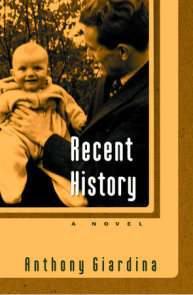READERS GUIDE
Crown Publishers and Anchor Books present a DISCUSSION GROUP GUIDE for the novels Only Twice I’ve Wished for Heaven andAn Eighth of August By Dawn Turner Trice
Set in the gritty heart of Chicago, Dawn Turner Trice’s debut novel, Only Twice I’ve Wished for Heaven, was hailed by the Washington Post as “a polished gem that shines from every angle, rich in rhythm, story, characterizations–.” In her second novel, An Eighth of August, Trice explores small-town life in southern Illinois, once again creating a work that sparkles with insight and humor. The discussion questions and author interview in this guide are designed to enhance your reading group’s discussion of these two portraits of African-American life in the late-twentieth century, limned by an author who has been compared to such distinguished and beloved writers as Gloria Naylor, Toni Morrison, James Baldwin, and Harper Lee.
Introduction
Tempestt Rosa Saville is a smart, adventurous 11-year-old when her family moves from the familiar streets of Chicago’s South Side to Lakeland, a luxurious gated haven for the city’s leading black professionals. For her father, a teacher at Lakeland’s much-touted “academy,” the move is the fulfillment of a lifelong dream. Tempestt, however, bridles at the snobbery and pretensions that are as much a part of Lakeland’s landscape as its carefully tended lawns, impeccably groomed population, and impenetrable fences. Her only friend is Valerie, the ill-kempt, mysterious girl who lives with John, the complex’s hard-working janitor.Eager to escape, Tempestt is soon embarking on forbidden excursions to 35th Street, the colorful, chaotic center of the projects that lie just beyond Lakeland’s borders. At the run-down O’Cala’s Food and Drug, she makes herself at home with the proprietor, Miss Jonetta, and a crew of misfits who form an odd, contentious, and loving family amid the squalor and dangers of the neighborhood. Certain that the clue to Valerie’s frequent absences from school and her reluctance to talk about her family are somehow connected to the world of 35th Street, Tempestt enlists their help in tracking down Valerie’s mother. The trail takes Jonetta into a past she has carefully buried, to memories of hopes that once seemed so promising, and to the flamboyant man who destroyed them. For Tempestt, Valerie’s story is far darker than anything she could have imagined, its repercussions much more than she can control.
Questions and Topics for Discussion
1. For discussion of Only Twice I’ve Wished for Heaven
: How do Tempestt’s first impressions of Lakeland [pp. 18-19] establish the themes of the novel? What details in her descriptions of the landscaping and buildings bring to life her uneasiness about the community? Enchanted with the surroundings, her father calls Lakeland “a place straight out of a fairy tale.” In what ways does Lakeland also embody the darker elements of traditional fairy tales?
2. How do Tempestt’s parent’s aspirations for themselves and their daughter differ? Discuss how their own backgrounds influence their reactions to Lakeland. Why does her mother, the daughter of a successful doctor, say “I don’t want her growing up the way I did –” [p. 28]? What regrets does she have about her own upbringing?
3. What initially draws Tempestt to 35th Street? Why does she find Alfred Mayes’s street-corner preaching so spellbinding and intriguing? What do Miss Jonetta and the men at O’Cala’s provide for Tempestt that her own family can’t?
4. Why are Valerie’s unexplained absences from school and other signs of trouble ignored by her teachers and fellow classmates? Why does Valerie tell Tempestt that she spends her afternoons with her mother “saving souls” in the projects [pp.199]? Is it only shame that prevents her from telling the truth?
5. How does Valerie’s fascination with birds offer insights into her feelings about herself and her place in Lakeland? What clues are there that despite her studied indifference Valerie longs to fit in? For example, what does Valerie’s excitement about the school dance and her overnight stay with Tempestt reveal?
6. How does John present himself before his true relationship with Valerie is revealed? Could he have done more to protect Valerie?
7. Only Twice tells two coming-of-age stories–Tempestt’s and Miss Jonetta’s. Which one did you find more compelling? More realistic? How does Jonetta’s rural Southern upbringing effect her expectations of and reactions to life in a northern city? Is her readiness to trust Alfred Mayes even after he has betrayed her understandable? How do her experiences as a young woman shape her eventual role in the community?
8. What impact do Judd, Fat Daddy, Mr. Chittey, and Hump have on Tempestt’s view of the world? Do Trice’s portraits of them reinforce or counteract common stereotypes of black men in today’s society? What passages or events are particularly effective in capturing each man’s nature?
9. Why does Tempestt’s father secretly visit their old neighborhood [p. 135]? What indications are there that he has doubts about the environment he has chosen for his family? Why doesn’t Tempestt’s mother discuss her own negative feelings about Lakeland with him? Why does it take a serious crisis to spur their departure from Lakeland?
10. Why does Alfred Mayes confess to a crime he didn’t commit? What responsibility, if any, does he bear for what happens to Valerie?
11. At the beginning of the book, Trice writes “Despite what lay outside the fence of Thirty-fifth Street, whatever the world had told people they couldn’t do or be or wish for, it didn’t apply to the residents of Lakeland–Once here, Lakelanders didn’t look back” [p.20]. What are the costs, both for individuals and for society as a whole, of this sharp division between classes? What have the residents of Lakeland sacrificed in their pursuit of economic and social rewards? What obligations, if any, do successful African-Americans have to those still trapped by poverty and racism?
For discussion of the two novels
1. Trice describes three different African-American communities–the posh Lakeland and sordid 35th Street in Only Twice, and the rural midwestern town of Halley’s Landing in An Eighth of August. In what ways do each of these communities reflect the history of African-Americans in this country and the social and economic realities of America today? What attitudes or beliefs do the characters who inhabit these very different worlds share?
2. Only Twice deals graphically with the problems of urban living–drug addiction, prostitution, casual violence, governmental indifference and neglect, not to mention that the fateful events in An Eighth of August are set in motion by Mr. Paul’s act of perversion. What keeps the negative events at the heart of the novels from overshadowing the stories Trice tells?
3. Why does Trice use more than one narrator? How do the changes in voice shape the stories she tells? Did you identify more closely with specific narrators, and if so, why?
4. Tempestt tells her story from the vantage point of twenty years, and the recollections in An Eighth of August switch back and forth from 1973 to 1986. How do the changing time frames and perspectives strengthen the power of the novels?
5. In Only Twice, all the characters are African-American. In her second novel, Trice included a white woman, May Ruth, as part of the community she creates. What do you think she was trying to accomplish by doing this? Does May Ruth’s background and race influence the way the other characters relate to her?
6. Both Tempestt and Pepper witness the death of their best friends, and both feel a sense of responsibility for the tragedy. How do their reactions differ? How do the reactions of the adults around them affect their abilities to cope with their guilt? We know that Tempestt ended up living a rich, fulfilling life. What do you think will happen to Pepper in the future?
From the Hardcover edition.



















